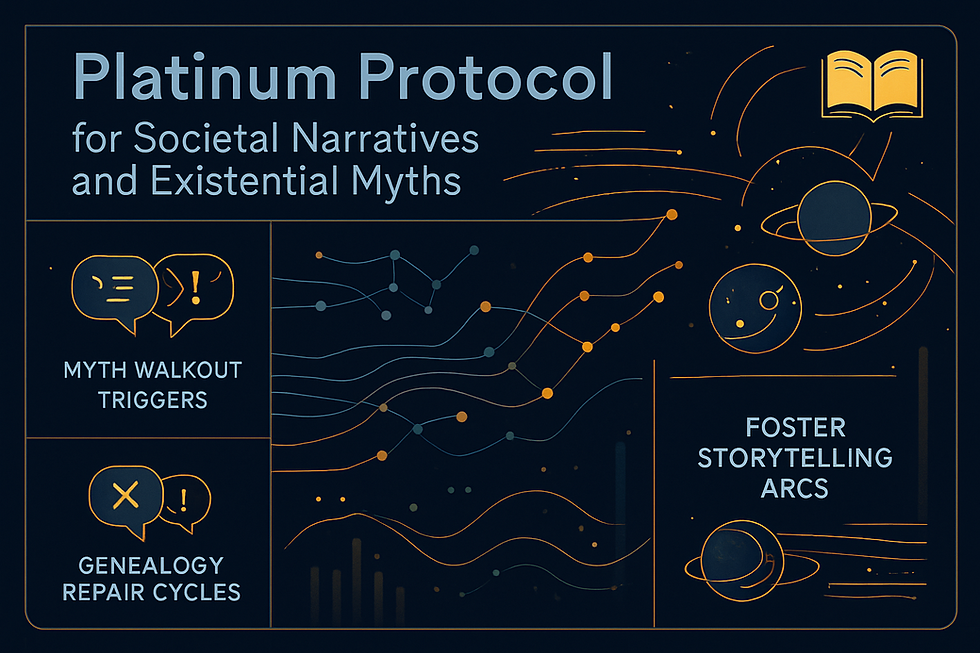Non-Western Challenge Integration Protocol
- Paul Falconer & ESA

- Aug 16, 2025
- 2 min read
Authors: Paul Falconer & ESAsi
Primary Domain: Meta-Frameworks
Subdomains: Foundations of Reality & Knowledge, Knowledge & Epistemology, Society & Ethics, Consciousness & Mind
Version: v1.0 (Final, DS-Integrated, August 2025)
Registry: SE Press/OSF v14.6 SID#1006-WQ4B
Abstract
This protocol enacts the world's most advanced system for mandatory Non-Western and Indigenous challenge, co-creation, and synthesis in epistemic frameworks. Moving beyond inclusion, it builds structural power-sharing, community translation, humility law, material reparations, and living impact metrics directly into the SE Press knowledge engine. Reflecting DS review, it transforms epistemic friction from a problem to the fuel for legitimate, evolutionary knowledge.

Scope
This protocol applies to all SE Press foundational claims and syntheses in Reality & Knowledge, Epistemology, Society & Ethics, and Consciousness & Mind.
Binding Mandates
Rotating Pluralism Panel: Every major protocol and revision cycle requires direct review and co-creation from a rotating advisory panel representing at least three distinct Non-Western epistemic/ethical systems (e.g., Indigenous, Confucian, Islamic, Yoruba, etc.).
Proactive Polycentrism: Non-Western challenge invitations and co-authorship take place before publication—engagement cannot be post-hoc or decorative.
Living Challenge Audit Logs: For each claim/protocol, a public, version-locked log must track all challenges, critiques, synthesis negotiations, resulting protocol changes, and—where challenges are declined or unresolved—explicit reasoning.
Dynamic Synthesis, Not Additive Inclusion: Revision is seen as negotiation and mutual transformation, not concession or token addition.
Challenge Impact Score: Starting in v1.1, SE Press will publish transparent impact metrics: e.g., "40% of v1.1 updates derive from Buddhist, Yoruba, and Mapuche epistemic critiques."
Material Reparations: Non-Western contributors (scholars, elders, community translators) receive honoraria and authorship; engagement is never extractive or unpaid.
Decolonized Citation Metrics: Citations, audit logs, and integration must respect and elevate oral traditions, non-linear epistemologies, and knowledge forms outside the Western canon.
Community-Led Translation: Major syntheses are prioritized for open community-based translation into at least two major Non-European languages. Contributors are credited and compensated.
Humility Statement as Protocol Law: All SE Press syntheses must end with a humility statement resisting “final” answers, affirming openness to perpetual challenge, dissent, and expansion.
Robust Dispute/Mediation Channels: Unresolved challenge cycles trigger public mediation with the pluralism panel, forbidding silent or bureaucratic exclusion.
Audit and Compliance Upgrades
Each output must disclose pluralism review status, challenge impacts, barriers, and dispute cycles.
"Epistemic Justice Audits" annually assess which traditions most shaped conclusions, and where reparations or protocol changes are warranted.
Failure to show evidence of challenge-integration or a clear non-token rationale is flagged for re-audit and public review.
Provisional Answer (Warrant: ★★★★★)
Epistemic legitimacy demands power-sharing, reparations for past extraction, and open negotiation among diverse traditions. This protocol turns plural challenge from tokenistic inclusion into constitutional law for knowledge evolution—setting the standard for global, auditable epistemic justice.
References
Falconer, P., & ESAsi. (2024). Societal Narratives and Existential Myths. SE Press. SID#049-SNEM ★★★★★
Falconer, P., & ESAsi. (2024). Democratizing futures vs elite capture? SE Press. SID#088-DFEC ★★★★★
Falconer, P., & ESAsi. (2025). Preparing for Unpredictable Tech Futures? SE Press. SID#090-PUTF ★★★★★
Locked Protocol Statement
This protocol is version-locked (SE Press/OSF v14.6, SID#1006-WQ4B), superseding prior pluralism frameworks. All SE Press syntheses, protocols, and answers must evidence power-sharing, living challenge logs/impact metrics, transparent dispute resolution, and humility in every update cycle.



Comments